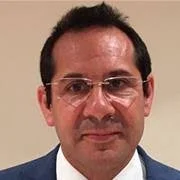
Our Clinical Steering Group
At Q-BIOMED, our mission is to engineer a new generation of quantum sensors that will transform the future of early diagnosis and treatment. We are committed to developing technologies that meet genuine healthcare needs and are designed with end users in mind.
To support this mission, we have established a Clinical Steering Group (CSG) to provide strategic guidance on the clinical applications and priorities of the Hub. The CSG brings together senior experts from neurology and neuroscience, cardiology, oncology, virology, radiology and global health. Its members include clinical practitioners and specialists, researchers in quantum sensing and healthcare technologies, healthcare policy leaders, and representatives from key healthcare organisations and patient advocacy groups.
Through this collaboration, the CSG ensures that Q-BIOMED’s research and innovation remain clinically relevant, patient-centred, and aligned with the evolving needs of global healthcare.
Our Clinical Steering Group Chairs
-

Professor Pier Lambiase
CSG CHAIR
Pier Lambiase is Professor of Cardiology at University College London and a consultant cardiologist at Barts Heart Centre. He is Chair of the Clinical Steering Group at Q-BIOMED. His work focuses on understanding and treating cardiac arrhythmias and sudden cardiac death, with a strong emphasis on translating electrophysiological research into clinical practice. He has led pioneering work in the potential use of quantum sensing technologies, particularly optically pumped magnetometer (OPM)–based magnetocardiography (MCG), to non-invasively map cardiac electrical activity with exceptional spatial and temporal precision. Working in collaboration with quantum physicists and biomedical engineers, he is helping to define how these technologies can transform early diagnosis and personalised treatment of heart rhythm disorders, bridging cutting-edge innovation with real-world clinical impact.
-

Dr Umesh Vivekananda
CSG DEPUTY CHAIR
Umesh Vivekananda is a Wellcome Clinical Career Development Fellow, an honorary consultant neurologist at the National Hospital for Neurology and Neurosurgery, and the Deputy Director of the UCL Q-BIOMED Hub. His work focuses on translating cutting-edge neuroscience and technology to improve the diagnosis and understanding of epilepsy. He is a leading researcher in the use of advanced neurophysiological recordings, such as Magnetoencephalography (MEG) and Electroencephalography (EEG), to identify epilepsy and cognitive states. He pioneered the use of portable OPM-MEG (optically pumped magnetometer) technology for epilepsy diagnosis, which allows for more natural patient movement during scans.
Our Clinical Steering Group
-
Professor Neil Sebire
CSG FOUNDING CHAIR
Professor of Paediatric and Developmental Pathology, University College London
-
Dr Sheena Visram
PRINCIPAL ADVISOR
-
Professor Ray Dolan
NEUROPSYCHIATRY
Kinross Professor of Neuropsychiatry, University College London and Director of the UCL-Max Planck Centre for Computational Psychiatry and Ageing
-
Professor Eleni Nastouli
CLINICAL VIROLOGY
Professor of Virology, University College London. Consultant clinical virologist at UCLH and honorary consultant in paediatric infectious diseases at Great Ormond Street Hospital
-
Professor Maryam Shahmanesh
GLOBAL HEALTH
Professor of Global Health, University College London
-
Professor Shonit Punwani
CLINICAL RADIOLOGY
Professor of Magnetic Resonance and Cancer Imaging, University College London
-
Dr Daniel Muñoz-Espín
ONCOLOGY
Research group leader at the Early Cancer Institute, University of Cambridge and Co-Lead of the Cancer Research UK Cambridge Centre Thoracic Cancer Programme
-
Professor Eric Miska
ONCOLOGY
Professor of Biochemistry, University of Cambridge
-
Professor Matthew Walker
NEUROLOGY
Professor of Neurology, University College London
-
Dr Marc Busche
DEMENTIA
Honorary Consultant Psychiatrist at Queen Square National Hospital for Neurology and Neurosurgery, and Programme Leader at University College London
Our CSG has five overarching goals:
Clinical needs assessment and use cases
Identify and prioritise clinical applications for quantum sensors in alignment with NHS guidelines.
Clinical trial and clinical validation strategy
Ensure clinical validation of quantum sensing technologies meets regulatory and clinical requirements.
Healthcare system integration and implementation pathways
Support and drive collaboration between clinicians, engineers and physicists.
Multi-disciplinary research and innovation facilitation
Develop strategies for integrating quantum biosensor technology into clinical practice.
Ethics, responsible research and innovation, patient involvement and engagement
Ensure ethical deployment, public trust, and regulatory compliance. Anticipate and explore the wider implications including ethics, legal issues, inclusivity, equality, diversity, unintended consequences and societal responsibility.



